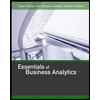
Loose Leaf for Corporate Finance Format: Loose-leaf
12th Edition
ISBN: 9781260139716
Author: Ross
Publisher: Mcgraw Hill Publishers
expand_more
expand_more
format_list_bulleted
Question
Chapter 4, Problem 3MC
Summary Introduction
Case summary:
Person B has completed his graduation six years before, with an undergraduate degree in finance. His aim is to become an investment banker; however, he is satisfied with his present job. Person B was searching for the best college to do an MBA program, which he thinks would assist him in achieving his aim. He was looking for University W and College M. The details of Person B's current job and his course structure are provided.
Characters in the case:
- Person B
- University W
- College M
- Company DL
- College R
- College M
- School B
Adequate information:
- Person B is not allowed to work anywhere until the completion of the MBA program.
- The salaries are not paid for the internship course.
To calculate: The best option for Person B assumes that the increase in salary payment occurs at the end of every year.
Expert Solution & Answer
Want to see the full answer?
Check out a sample textbook solution
Students have asked these similar questions
What is the Biblical perspective on the Capital Markets, and what is the relationship between them?
How do they research the Biblical perspective on the Capital Markets?
Could you help explain how research will fulfill this requirement and integrate a Christian worldview?
Nina buys a new utility sports vehicle for 32,000 dollars. She trades in her old truck and received 10,000 dollars, which she uses as a down payment. She finances the balance at 8% APR over 36 months. Before making her 24th payment, she decides to pay off the loan. How much interest will Nina save by paying off the loan early.
General Problems: Market volatility and bubbles.
How can the problem of:
Insider trading and market manipulation,
Lack of transparency and information asymmetry,
Inequality in access to capital, and
Systemic risk from interconnected financial institutions
be solved?
How can practice or issue be improved?
Chapter 4 Solutions
Loose Leaf for Corporate Finance Format: Loose-leaf
Ch. 4 - Prob. 1CQCh. 4 - Prob. 2CQCh. 4 - Prob. 3CQCh. 4 - Prob. 4CQCh. 4 - Time Value On subsidized Stafford loans, a common...Ch. 4 - Prob. 6CQCh. 4 - Prob. 7CQCh. 4 - Prob. 8CQCh. 4 - Prob. 9CQCh. 4 - Prob. 10CQ
Ch. 4 - Simple Interest versus Compound Interest First...Ch. 4 - Prob. 2QAPCh. 4 - Prob. 3QAPCh. 4 - Calculating Interest Rates Solve for the unknown...Ch. 4 - Prob. 5QAPCh. 4 - Prob. 6QAPCh. 4 - Prob. 7QAPCh. 4 - Calculating Rates of Return Although appealing to...Ch. 4 - Prob. 9QAPCh. 4 - Prob. 10QAPCh. 4 - Present Value and Multiple Cash Flows Specter Co....Ch. 4 - Prob. 12QAPCh. 4 - Calculating Annuity Present Value An investment...Ch. 4 - Prob. 14QAPCh. 4 - Prob. 15QAPCh. 4 - Prob. 16QAPCh. 4 - Calculating EAR First National Bank charges 11.4...Ch. 4 - Prob. 18QAPCh. 4 - Calculating Number of Periods One of your...Ch. 4 - Prob. 20QAPCh. 4 - Prob. 21QAPCh. 4 - Simple Interest versus Compound Interest First...Ch. 4 - Calculating Annuities You are planning to save for...Ch. 4 - Prob. 24QAPCh. 4 - Prob. 25QAPCh. 4 - Prob. 26QAPCh. 4 - Prob. 27QAPCh. 4 - Prob. 28QAPCh. 4 - Prob. 29QAPCh. 4 - Prob. 30QAPCh. 4 - Calculating Interest Expense You receive a credit...Ch. 4 - Prob. 32QAPCh. 4 - Growing Annuity Southern California Publishing...Ch. 4 - Prob. 34QAPCh. 4 - Prob. 35QAPCh. 4 - Prob. 36QAPCh. 4 - Prob. 37QAPCh. 4 - Calculating Loan Payments You need a 30-year...Ch. 4 - Prob. 39QAPCh. 4 - Prob. 40QAPCh. 4 - Prob. 41QAPCh. 4 - Prob. 42QAPCh. 4 - Prob. 43QAPCh. 4 - Prob. 44QAPCh. 4 - Prob. 45QAPCh. 4 - Prob. 46QAPCh. 4 - Prob. 47QAPCh. 4 - Prob. 48QAPCh. 4 - Prob. 49QAPCh. 4 - Prob. 50QAPCh. 4 - Prob. 51QAPCh. 4 - Prob. 52QAPCh. 4 - Prob. 53QAPCh. 4 - Prob. 54QAPCh. 4 - Prob. 55QAPCh. 4 - Prob. 56QAPCh. 4 - Prob. 57QAPCh. 4 - Prob. 58QAPCh. 4 - Prob. 59QAPCh. 4 - Prob. 60QAPCh. 4 - Prob. 61QAPCh. 4 - Prob. 62QAPCh. 4 - Prob. 63QAPCh. 4 - Prob. 64QAPCh. 4 - Prob. 65QAPCh. 4 - Prob. 66QAPCh. 4 - Prob. 67QAPCh. 4 - Prob. 68QAPCh. 4 - Prob. 69QAPCh. 4 - Prob. 70QAPCh. 4 - Prob. 71QAPCh. 4 - Prob. 72QAPCh. 4 - Prob. 73QAPCh. 4 - Prob. 74QAPCh. 4 - Rule or 69.3 A corollary to the Rule of 72 is the...Ch. 4 - Prob. 1MCCh. 4 - Prob. 2MCCh. 4 - Prob. 3MCCh. 4 - Prob. 4MCCh. 4 - Prob. 5MC
Knowledge Booster
Similar questions
- If submitted image is blurr then please comment i will write values. i will give unhelpful please.arrow_forwardWhat are capital markets, and what is the purpose of capital markets? What is the foundation of the study on capital markets coping methods and increasing self-understanding? What are the general problems of capital markets to be addressed, and what are the consequences arising from the capital market?arrow_forwardMeticulous Drill & Reamer (MD&R) specializes in drilling and boring precise holes in hard metals (e.g., steel alloys, tungsten carbide, and titanium). The company recently contracted to drill holes with 3-centimeter diameters in large carbon-steel alloy disks, and it will have to purchase a special drill to complete this job. MD&R has eliminated all but two of the drills it has been considering: Davis Drills' T2005 and Worth Industrial Tools' AZ100. These producers have each agreed to allow MD&R to use a T2005 and an AZ100 for one week to determine which drill it will purchase. During the one-week trial, MD&R uses each of these drills to drill 31 holes with a target diameter of 3 centimeters in one large carbon-steel alloy disk, then measures the diameter of each hole and records the results. MD&R's results are provided in the table that follows and are available in the DATAfile named MeticulousDrills, Hole Diameter T2005 AZ100 3.06 2.91 3.04 3.31 3.13 2.82 3.01 3.01 2.95 2.94 3.02…arrow_forward
- I mistakenly submitted blurr image please comment i will write values. please dont Solve with incorrect values otherwise unhelpful.arrow_forwardhello tutor:If submitted image is blurr then please comment i will write values. i will give unhelpful please.arrow_forwardLara Fredericks is interested in two mutually exclusive investments. Both investments cover the same time horizon of 5 years. The cost of the first investment is $9900, and Lara expects equal and consecutive year-end payments of $3400. The second investment promises equal and consecutive payments of $4100 with an initial outlay of $12500 required. The current required return on the first investment is 8.4 %, and the second carries a required return of 10.4 %.a. What is the net present value of the first investment?b. What is the net present value of the second investment?c. Being mutually exclusive, which investment should Lara choose? d. Which investment is relatively more risky? Explain.arrow_forward
- What are some of the characteristics of a firm with a long operating cycle?arrow_forwardAbout this Assignment For this Corporate Finance 301 assignment, you will submit a research paper that analyzes the types of organizational business structures. You will apply knowledge of business structure concepts as acquired in the course. The research paper should follow APA formatting style. Project Prompts The written research paper should be at least 1,000 to 1,200 words in length and should include four sections based on the business structures studied throughout the course. Define each business structure, compare the corporate finance strategies of the four business structures, discuss the advantages and disadvantages of each business structure, and how each varies in taxation. Research Paper Sections ⚫ Sole Proprietorship ⚫ Partnership • Corporation ⚫ Limited Liability Company (LLC)arrow_forwardPLEASE ANSWER THE COLUMN FULLY AND CORRECTLY PLEASE DO THE RIGHT CALCULATION DOUBLE CHECK AS WELL TO GIVE ME THE RIGHT ANSWER REQUIRED: Given the following information, what are the NZD/SGD currency against currency bid-ask quotations? Note: Do not round intermediate calculations. Round your answers to 4 decimal places. Bank Quotations American Terms European Terms Bid Ask Bid Ask New Zealand dollar 0.733 0.7340 1.3870 1.3884 Singapore dollar 0.6186 0.6191 1.6423 1.6436 answer Bid Ask New Zealand dollar ? ? Singapore dollar ? ?arrow_forward
- About this Assignment For the Corporate Finance 301 assignment, you will submit a research paper that analyzes and discusses organizational financial risks. You will apply knowledge acquired in the course and use the concepts of multiple financial risks as the basis of research and analysis. The research paper should follow APA formatting style. Audience: upper-level business students. Project Prompt Write a 1,000-1,200-word analysis discussing financial risk concepts and assess the impact of the different financial risks on an organization. For this assignment, you will structure your assignment using four research paper sections associated with corporate risk management, as studied in the course. Base your research paper on the financial statements analyzed in Corporate Finance 301 assignment 2 and apply the knowledge acquired in the analysis. Define each financial risk, discuss the risk associated components, and evaluate the financial risks and how they affect the corporation's…arrow_forwardBobby Nelson, made deposits of $880 at the end of each year for 6 years. Interest is 6% compounded annually. What is the value of Bobby’s annuity at the end of 6 years?arrow_forward1. Find the future value if $1,250 is invested in Simple interest account paying 6.5%: a. for 5 years b. for 20 years 2. Find the future amount $ 35,000 is invested for 30 years at 4.25% compounded: a. annually b. Quarterly c. monthly d. weekly 3. How much should be put into an account today that pays 7.75% compounded monthly if you need $10,000 in 5 years. 4. Find the effective rate for: a. 5.75% compounded quarterly b. 6.25% compounded daily. 5. $50 is invested at the end of each month into an account paying 7.5% compounded monthly. How much will be in the account after 5 years?…arrow_forward
arrow_back_ios
SEE MORE QUESTIONS
arrow_forward_ios
Recommended textbooks for you
 Essentials of Business Analytics (MindTap Course ...StatisticsISBN:9781305627734Author:Jeffrey D. Camm, James J. Cochran, Michael J. Fry, Jeffrey W. Ohlmann, David R. AndersonPublisher:Cengage Learning
Essentials of Business Analytics (MindTap Course ...StatisticsISBN:9781305627734Author:Jeffrey D. Camm, James J. Cochran, Michael J. Fry, Jeffrey W. Ohlmann, David R. AndersonPublisher:Cengage Learning Intermediate Financial Management (MindTap Course...FinanceISBN:9781337395083Author:Eugene F. Brigham, Phillip R. DavesPublisher:Cengage Learning
Intermediate Financial Management (MindTap Course...FinanceISBN:9781337395083Author:Eugene F. Brigham, Phillip R. DavesPublisher:Cengage Learning Cornerstones of Cost Management (Cornerstones Ser...AccountingISBN:9781305970663Author:Don R. Hansen, Maryanne M. MowenPublisher:Cengage Learning
Cornerstones of Cost Management (Cornerstones Ser...AccountingISBN:9781305970663Author:Don R. Hansen, Maryanne M. MowenPublisher:Cengage Learning Pfin (with Mindtap, 1 Term Printed Access Card) (...FinanceISBN:9780357033609Author:Randall Billingsley, Lawrence J. Gitman, Michael D. JoehnkPublisher:Cengage Learning
Pfin (with Mindtap, 1 Term Printed Access Card) (...FinanceISBN:9780357033609Author:Randall Billingsley, Lawrence J. Gitman, Michael D. JoehnkPublisher:Cengage Learning


Essentials of Business Analytics (MindTap Course ...
Statistics
ISBN:9781305627734
Author:Jeffrey D. Camm, James J. Cochran, Michael J. Fry, Jeffrey W. Ohlmann, David R. Anderson
Publisher:Cengage Learning


Intermediate Financial Management (MindTap Course...
Finance
ISBN:9781337395083
Author:Eugene F. Brigham, Phillip R. Daves
Publisher:Cengage Learning

Cornerstones of Cost Management (Cornerstones Ser...
Accounting
ISBN:9781305970663
Author:Don R. Hansen, Maryanne M. Mowen
Publisher:Cengage Learning

Pfin (with Mindtap, 1 Term Printed Access Card) (...
Finance
ISBN:9780357033609
Author:Randall Billingsley, Lawrence J. Gitman, Michael D. Joehnk
Publisher:Cengage Learning